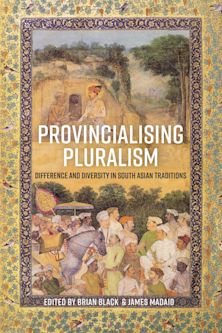Three Pillars of Skepticism in Classical India
Nagarjuna, Jayarasi, and Sri Harsa
Three Pillars of Skepticism in Classical India
Nagarjuna, Jayarasi, and Sri Harsa
Description
Beginning with the earliest strata of Indian philosophy, this book uncovers a distinct tradition of skepticism in Indian philosophy through a study of the “three pillars” of Indian skepticism near the beginning, middle, and end of the classical era: Nagarjuna (c. 150-200 CE), Jayarasi (c. 770-830 CE), and Sri Har?a (c. 1125-1180 CE). Moving beyond the traditional school model of understanding the history of Indian philosophy, this book argues that the philosophical history of India contains a tradition of skepticism about philosophy represented most clearly by three figures coming from different schools but utilizing similar methods: Nagarjuna, Jayarasi, and Sri Har?a. This book argues that there is a category of skepticism often overlooked by philosophers today: skepticism about philosophy, varieties of which are found not only in classical India but also in the Western tradition in Pyrrhonian skepticism. Skepticism about philosophy consists of intellectual therapies for those afflicted by the quest for dogmatic beliefs. The book begins with the roots of this type of skepticism in ancient India in the ?g Veda, Upani?ads, and early Buddhist texts. Then there are two chapters on each of the three major figures: one chapter giving each philosopher’s overall aims and methods and a second demonstrating how each philosopher applies these methods to specific philosophical issues. The conclusion shows how the history of Indian skepticism might help to answer philosophy’s detractors today: while skeptics demonstrate that we should be modest about philosophy’s ability to produce firm answers, philosophy nonetheless has other uses such as cultivating critical thinking skills and lessening dogmatism. This book is situated within a larger project of expanding the history of philosophy. Just as the history of Western philosophy ought to inform contemporary philosophy, so should expanding the history of philosophy to include classical India illuminate understandings of philosophy today: its value, limits, and what it can do for us in the 21st century.
Table of Contents
Chapter 1: Skeptical Roots in Early Indian Philosophy: ?g Veda, Upani?ads, and Early Buddhist Texts
Chapter 2: Nagarjuna’s Buddhist Skepticism: From Emptiness to the Pacification of Conceptual Proliferation
Chapter 3: Nagarjuna and the Cause of Skepticism
Chapter 4: Jayarasi’s Carvaka Skepticism: Irreligious Skepticism about Philosophy
Chapter 5: Jayarasi and the Delightful Destruction of Buddhist Epistemology
Chapter 6: Sri Har?a’s Advaita Skepticism: The Critique of Realism and the Possibility of Mysticism
Chapter 7: Sri Har?a on Knowledge, Existence, and the Limits of Philosophy
Conclusion: The History of Indian Skepticism and Mitigated Skepticism about Philosophy
Product details
| Published | 15 Sep 2018 |
|---|---|
| Format | Ebook (Epub & Mobi) |
| Edition | 1st |
| Extent | 254 |
| ISBN | 9781498555708 |
| Imprint | Lexington Books |
| Series | Studies in Comparative Philosophy and Religion |
| Publisher | Bloomsbury Publishing |
Reviews

ONLINE RESOURCES
Bloomsbury Collections
This book is available on Bloomsbury Collections where your library has access.


































